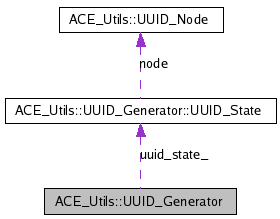ACE_Utils::UUID_Generator Class Reference
#include <UUID.h>

Public Types | |
| enum | { ACE_UUID_CLOCK_SEQ_MASK = 0x3FFF } |
| typedef ACE_UINT64 | UUID_Time |
Public Member Functions | |
| UUID_Generator () | |
| ~UUID_Generator () | |
| void | init (void) |
| void | generate_UUID (UUID &, ACE_UINT16 version=0x0001, u_char variant=0x80) |
| UUID * | generate_UUID (ACE_UINT16 version=0x0001, u_char variant=0x80) |
| ACE_SYNCH_MUTEX * | lock (void) |
| void | lock (ACE_SYNCH_MUTEX *lock, bool release_lock) |
| Set a new locking strategy and return the old one. | |
Private Member Functions | |
| void | get_timestamp (UUID_Time ×tamp) |
| void | get_timestamp_and_clocksequence (UUID_Time ×tamp, ACE_UINT16 &clockSequence) |
| void | get_systemtime (UUID_Time &timeNow) |
| the Christian calendar). | |
Private Attributes | |
| UUID_Time | time_last_ |
| The system time when that last uuid was generated. | |
| UUID_State | uuid_state_ |
| The UUID generator persistent state. | |
| ACE_SYNCH_MUTEX * | lock_ |
| bool | destroy_lock_ |
Classes | |
| struct | UUID_State |
Member Typedef Documentation
Type to represent UTC as a count of 100 nanosecond intervals since 00:00:00.00, 15 October 1582.
Member Enumeration Documentation
Constructor & Destructor Documentation
| ACE_Utils::UUID_Generator::UUID_Generator | ( | ) |
| ACE_Utils::UUID_Generator::~UUID_Generator | ( | ) |
Member Function Documentation
| void ACE_Utils::UUID_Generator::init | ( | void | ) |
| void ACE_Utils::UUID_Generator::generate_UUID | ( | UUID & | uuid, | |
| ACE_UINT16 | version = 0x0001, |
|||
| u_char | variant = 0x80 | |||
| ) |
Format timestamp, clockseq, and nodeID into an UUID of the specified version and variant. For generating UUID's with thread and process ids use variant=0xc0
| UUID * ACE_Utils::UUID_Generator::generate_UUID | ( | ACE_UINT16 | version = 0x0001, |
|
| u_char | variant = 0x80 | |||
| ) |
Format timestamp, clockseq, and nodeID into a VI UUID. For generating UUID's with thread and process ids use variant=0xc0
| ACE_SYNCH_MUTEX * ACE_Utils::UUID_Generator::lock | ( | void | ) |
The locking strategy prevents multiple generators from accessing the UUID_state at the same time. Get the locking strategy.
| void ACE_Utils::UUID_Generator::lock | ( | ACE_SYNCH_MUTEX * | lock, | |
| bool | release_lock | |||
| ) |
Set a new locking strategy and return the old one.
| void ACE_Utils::UUID_Generator::get_timestamp | ( | UUID_Time & | timestamp | ) | [private] |
Obtain a UUID timestamp. Compensate for the fact that the time obtained from getSystem time has a resolution less than 100ns.
Obtain a new timestamp. If UUID's are being generated too quickly the clock sequence will be incremented
| void ACE_Utils::UUID_Generator::get_timestamp_and_clocksequence | ( | UUID_Time & | timestamp, | |
| ACE_UINT16 & | clockSequence | |||
| ) | [private] |
Obtain a UUID timestamp and clock sequence. Compensate for the fact that the time obtained from getSystem time has a resolution less than 100ns.
| void ACE_Utils::UUID_Generator::get_systemtime | ( | UUID_Time & | timestamp | ) | [private] |
the Christian calendar).
Obtain the system time in UTC as a count of 100 nanosecond intervals since 00:00:00.00, 15 October 1582 (the date of Gregorian reform to
ACE_Time_Value is in POSIX time, seconds since Jan 1, 1970. UUIDs use time in 100ns ticks since 15 October 1582. The difference is: 15 Oct 1582 - 1 Jan 1600: 17 days in Oct, 30 in Nov, 31 in Dec + 17 years and 4 leap days (1584, 88, 92 and 96) 1 Jan 1600 - 1 Jan 1900: 3 centuries + 73 leap days ( 25 in 17th cent. and 24 each in 18th and 19th centuries) 1 Jan 1900 - 1 Jan 1970: 70 years + 17 leap days. This adds up, in days: (17+30+31+365*17+4)+ (365*300+73)+ (365*70+17) or 122192928000000000U (0x1B21DD213814000) 100 ns ticks.
Get the time of day, convert to 100ns ticks then add the offset.
Member Data Documentation
The system time when that last uuid was generated.
The UUID generator persistent state.
ACE_SYNCH_MUTEX* ACE_Utils::UUID_Generator::lock_ [private] |
bool ACE_Utils::UUID_Generator::destroy_lock_ [private] |
The documentation for this class was generated from the following files:
 1.5.5
1.5.5